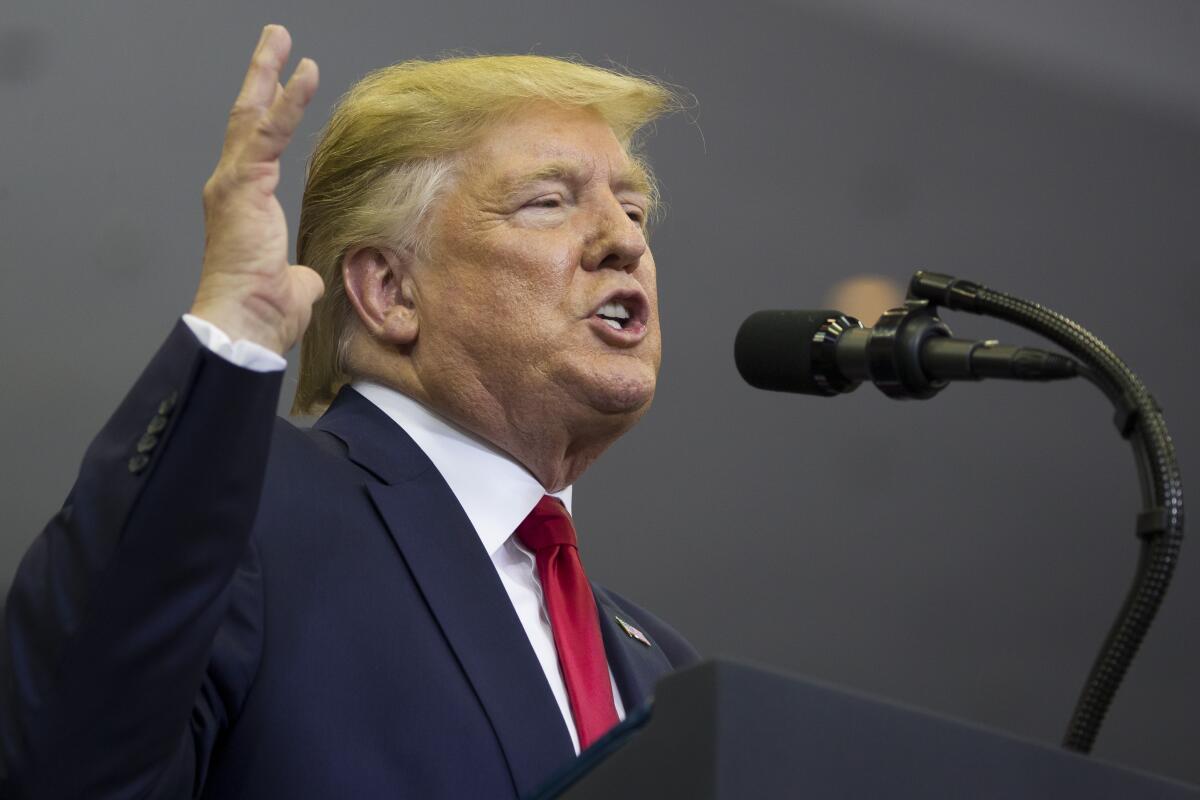Op-Ed: There have been periods of turmoil before — but not with Trump at the helm

Last spring, just over a year ago, the country was digesting and then debating the Mueller report, one of the most anticipated special investigations in history. That came and went.
Then, less than five months ago, the Senate exonerated President Trump, only the third president to be impeached in the nation’s nearly two-and-a-half-century history and by any measure an event of enormous consequence. Now that seems buried in some misty past, an event from another age.
For the last three months, much of the nation has quaked in fear of a deadly virus.
Now, in some places, that too is nearly forgotten — though still a perilous threat — as we take up serious discussions about race and the police.
Somewhere in there came a struggle for the Democratic presidential nomination, which captured our attention for a while as candidates debated vital issues from climate change to health insurance. Did that leave any lasting impact? And who was Pete Buttigieg anyway?
There have been periods like this before. There was 1941, when the splendid summer of Joe DiMaggio (hitting safely in 56 consecutive games) and Ted Williams (finishing the baseball season with a .406 average) was wiped away by Pearl Harbor and the onset of World War II. There was 1968, when a civil rights leader (the Rev. Martin Luther King Jr.) and a presidential contender (Robert F. Kennedy) were assassinated and violence flared in the cities. There was 2001, when a terrorist attack prompted fresh questions about the balance between personal security and civil liberties in a democratic society.
But this period has one characteristic that sets it apart from other periods of emergencies and rapid changes: President Trump.
It used to be that crises took time. The country was tortured by Vietnam and Watergate for more than a decade. Both spawned debates, books, conferences, legislation. Their implications washed over us, wave after wave of interpretation and introspection.
Some of the tsunamis of the Trump years are gone already. Poof!
Five months ago he broke his own record by issuing 142 tweets and retweets in one day. On average he tweets 26 times a day. Every morning his impulsive outbursts become national issues. One day the country is torqued by his science-flouting prescriptions for fighting the coronavirus, the next by his demeaning comments about Joe Biden, Hillary Rodham Clinton or Mitt Romney, and then it’s on to his threat to deploy military forces to break up protests or bring rebels to heel in Seattle.
Compare that with Franklin Delano Roosevelt, whose challenges (the Great Depression, World War II) arguably were more formidable than anything the current occupant of the White House faces.
In 1934 — a year of some consequence, holding as it did the Dust Bowl, the dust-ups of the New Deal, and the crime waves of John Dillinger, Babyface Nelson, Pretty Boy Floyd and Bonnie and Clyde — FDR showed enormous restraint, shaping the national conversation, certainly, but not dominating the nation’s attention.
“I know,’’ Roosevelt said in a letter he wrote in that year when two out of three workers in the construction industries were out of work, “that the public psychology, and for that matter personal psychology, cannot, because of human weakness, be attuned for long periods of time to a constant repetition of the highest note in the scale.”
We are living in an entirely different world.
“We’re caught in a 21st century cyclone, with shattering news occurring on a 48-hour basis,’’ Douglas Brinkley, the Rice University historian, told me in a telephone conversation. “The tempo is unbelievably high. And we have more to come because we have the most polarized society that we have had in many years.’’
Indeed, no one can predict what’s coming next, especially since locusts (at this moment swarming Asia and Africa) already have been spoken for. Consider a video now circulating in England. “Show me the future,’’ the comedian Michael McIntyre says to a seer he consults just before the COVID-19 pandemic.
‘’You will be substitute teacher and amateur hairdresser,’’ he is told. And he is informed that the big trip he will be taking in 2020 will not be the safari he had planned with his friends. “The trip you are most excited about next year is a trip to ... the garden center.’’ Plus this: “Your friends will no longer come within two meters of you.”
And though predictions clearly are perilous in this atmosphere, let me offer one of my own. The fall election will not be about socialism, nor the economy, nor foreign affairs, nor even about the immensely consequential issues of race and justice that are in the air and in the streets today. It will turn instead on whether after the Trump years the country is simply exhausted and needs a rest and respite.
David Shribman, a nationally syndicated columnist, teaches U.S. politics at the Max Bell School of Public Policy at Montreal’s McGill University.
More to Read
A cure for the common opinion
Get thought-provoking perspectives with our weekly newsletter.
You may occasionally receive promotional content from the Los Angeles Times.










